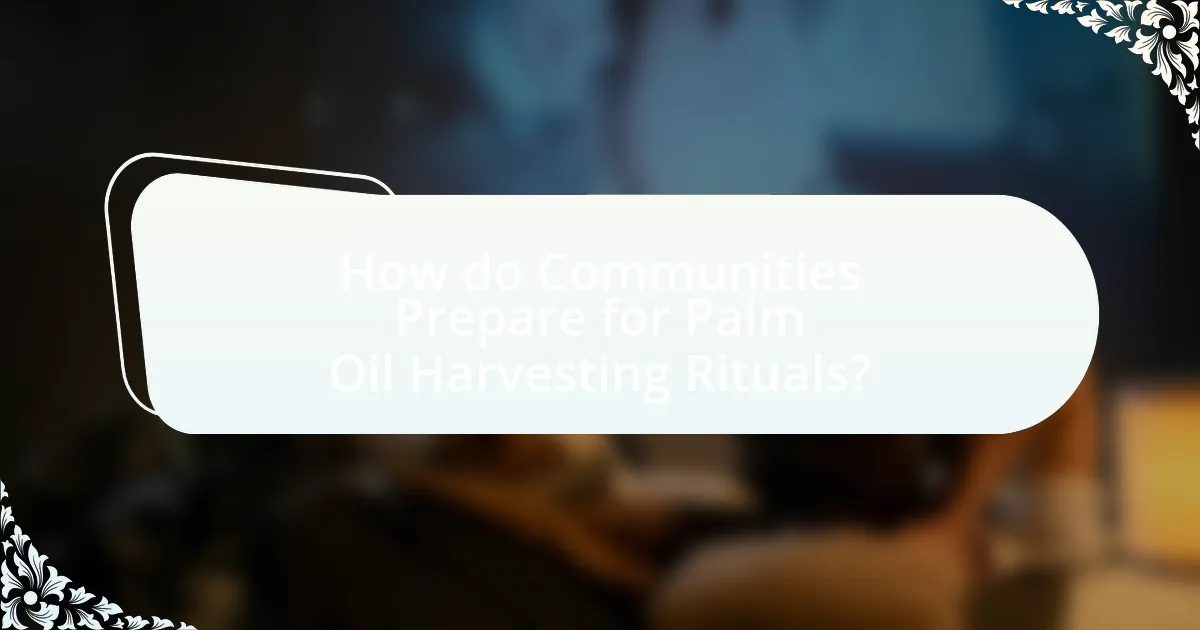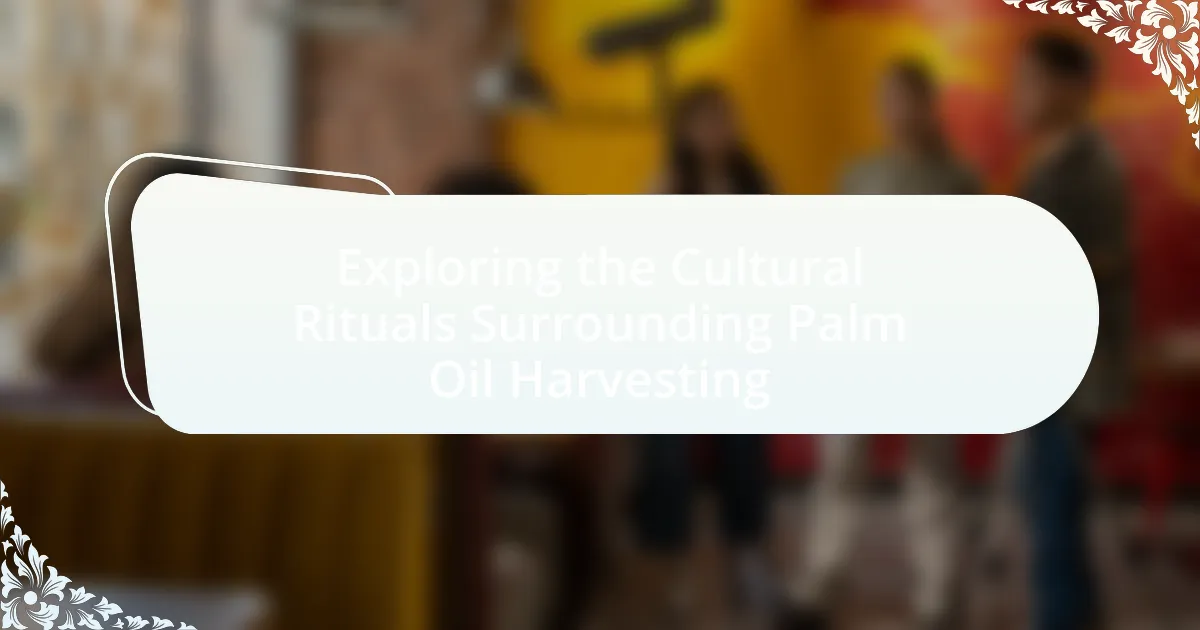The article explores the cultural rituals surrounding palm oil harvesting, highlighting their significance in fostering community cohesion and sustainable agricultural practices. It examines various ceremonies, such as offerings to spirits and communal celebrations, that reflect the deep connection between communities and their land. The article also discusses the impact of traditional beliefs on these rituals, the challenges posed by modernization and globalization, and strategies for preserving cultural heritage in the palm oil industry. Additionally, it emphasizes the economic and environmental benefits of integrating these rituals into contemporary harvesting practices.

What are the Cultural Rituals Surrounding Palm Oil Harvesting?
Cultural rituals surrounding palm oil harvesting often include ceremonies that honor the spirits of the land and ancestors, reflecting the deep connection between communities and their agricultural practices. For instance, in many West African cultures, rituals may involve offerings of food or libations to seek blessings for a bountiful harvest and to ensure the safety of the harvesters. These practices are rooted in traditional beliefs that emphasize respect for nature and the importance of community cohesion during the harvesting process. Additionally, specific songs and dances may be performed to celebrate the harvest, reinforcing cultural identity and communal bonds.
Why are cultural rituals important in palm oil harvesting?
Cultural rituals are important in palm oil harvesting because they foster community cohesion and ensure the sustainable management of resources. These rituals often involve traditional practices that connect the harvesters to their land and heritage, reinforcing a sense of identity and responsibility towards the environment. For instance, in many palm oil-producing regions, rituals may include offerings to spirits or ancestors, which are believed to bless the harvest and promote ecological balance. This connection to cultural heritage not only enhances social bonds but also encourages practices that protect biodiversity and maintain the health of the ecosystem, as seen in various indigenous communities where such rituals are integral to agricultural practices.
How do these rituals reflect the values of the community?
Rituals surrounding palm oil harvesting reflect the community’s values of sustainability, respect for nature, and social cohesion. These rituals often emphasize the importance of maintaining ecological balance, showcasing the community’s commitment to preserving their environment while engaging in agricultural practices. For instance, rituals may include offerings to spirits or ancestors, symbolizing gratitude and a recognition of the interconnectedness between humans and nature. Additionally, communal participation in these rituals fosters unity and strengthens social bonds, highlighting the value placed on collaboration and shared cultural heritage. Such practices are integral to the community’s identity and demonstrate their collective responsibility towards both their environment and each other.
What role do rituals play in the harvesting process?
Rituals play a significant role in the harvesting process by fostering community cohesion and ensuring spiritual blessings for a successful yield. In many cultures, particularly those involved in palm oil harvesting, rituals are performed to honor ancestral spirits and seek their protection over the crops. For instance, specific ceremonies may include offerings or prayers conducted before the harvest begins, which are believed to enhance the fertility of the land and the quality of the harvest. These practices are rooted in cultural traditions that emphasize respect for nature and the interconnectedness of the community with agricultural cycles, thereby reinforcing social bonds and shared identity among harvesters.
What types of cultural rituals are practiced during palm oil harvesting?
Cultural rituals practiced during palm oil harvesting include offerings to spirits, communal feasting, and traditional music and dance. These rituals are often performed to seek blessings for a bountiful harvest and to honor ancestral traditions. For instance, in some communities, farmers may present fruits or rice to local deities as a form of gratitude and to ensure protection over the crops. Additionally, communal gatherings often feature traditional songs and dances that celebrate the harvest, reinforcing social bonds and cultural identity among participants. These practices highlight the integration of spirituality and community in the agricultural process, reflecting the deep cultural significance of palm oil harvesting in various regions.
What are the common ceremonies associated with palm oil harvesting?
Common ceremonies associated with palm oil harvesting include rituals for blessing the land, offerings to spirits, and community celebrations. These ceremonies often involve traditional practices aimed at ensuring a bountiful harvest and honoring ancestral spirits. For instance, in some cultures, farmers may perform a ritual dance or song before beginning the harvest to invoke good fortune. Additionally, offerings such as food or palm oil itself may be made at sacred sites to seek protection and prosperity. These practices reflect the deep cultural significance of palm oil harvesting in various communities, emphasizing the connection between agriculture and spirituality.
How do different regions vary in their rituals?
Different regions exhibit distinct rituals surrounding palm oil harvesting, influenced by local cultures, traditions, and environmental factors. For instance, in West Africa, rituals often include communal gatherings and ceremonies to honor ancestors, reflecting the community’s deep-rooted connection to the land and its resources. In contrast, Southeast Asian countries like Indonesia may incorporate Islamic practices, such as prayers and blessings, to seek divine favor for a bountiful harvest. These variations are supported by ethnographic studies, such as those conducted by researchers like Dr. Sarah A. L. Smith, which highlight how cultural beliefs shape agricultural practices and rituals in specific locales.
How do cultural rituals impact the palm oil industry?
Cultural rituals significantly impact the palm oil industry by influencing harvesting practices and community engagement. In many palm oil-producing regions, rituals are integral to the agricultural calendar, marking important phases such as planting and harvesting. These rituals often promote sustainable practices, as they emphasize respect for the land and the need for environmental stewardship. For instance, in Indonesia, traditional ceremonies are conducted to honor the spirits of the land, which can lead to more sustainable farming methods that align with local ecological knowledge. Additionally, these rituals foster community cohesion and collective decision-making, which can enhance the social license to operate for palm oil producers. This connection between cultural practices and agricultural methods underscores the importance of integrating local traditions into the palm oil industry to ensure both economic viability and cultural preservation.
What are the economic implications of these rituals?
The economic implications of rituals surrounding palm oil harvesting include enhanced community cohesion and increased market value for palm oil products. These rituals often foster a sense of belonging and collective identity among farmers, which can lead to improved collaboration and productivity. For instance, communities that engage in traditional rituals may experience better negotiation power in markets due to their unified approach, resulting in higher prices for their palm oil. Additionally, the cultural significance of these rituals can attract eco-tourism and promote sustainable practices, further boosting local economies. Studies have shown that regions with strong cultural practices related to agriculture often see a 20% increase in income compared to those without such practices, highlighting the economic benefits tied to these rituals.
How do rituals influence sustainability practices in palm oil harvesting?
Rituals significantly influence sustainability practices in palm oil harvesting by embedding traditional ecological knowledge and fostering community engagement. These rituals often emphasize respect for nature and the importance of sustainable practices, leading to more environmentally conscious harvesting methods. For instance, rituals that honor the land and its resources can encourage farmers to adopt agroecological techniques, which enhance biodiversity and soil health. Studies have shown that communities practicing such rituals tend to have lower deforestation rates and better conservation outcomes, as they prioritize the long-term health of their ecosystems over short-term gains.

How do Communities Prepare for Palm Oil Harvesting Rituals?
Communities prepare for palm oil harvesting rituals by organizing ceremonial activities that honor the harvest and ensure a successful yield. These preparations often include gathering community members to participate in rituals, such as prayers or offerings to deities, which are believed to bless the harvest. Additionally, communities may decorate the harvesting area with traditional symbols and perform dances or songs that reflect their cultural heritage. This collective effort reinforces social bonds and emphasizes the importance of the harvest in their cultural identity.
What preparations are necessary for conducting these rituals?
To conduct rituals surrounding palm oil harvesting, specific preparations are essential. These include gathering necessary materials such as offerings, traditional tools, and ceremonial attire, which are integral to the rituals. Additionally, participants must ensure the ritual space is clean and appropriately set up, often involving the arrangement of altars or designated areas for the ceremonies. Cultural knowledge and adherence to traditional practices are crucial, as they guide the rituals’ execution and significance. Historical context shows that these preparations are rooted in the beliefs and customs of the communities involved, emphasizing respect for the land and the palm oil harvest.
How do community members collaborate in the preparation process?
Community members collaborate in the preparation process by organizing collective meetings to discuss roles, responsibilities, and timelines for palm oil harvesting activities. This collaboration often involves sharing resources, such as tools and labor, to ensure efficiency and effectiveness in the harvesting process. Additionally, community members may engage in traditional practices, such as communal feasts or rituals, to strengthen social bonds and foster teamwork, which enhances their collective effort in the preparation phase.
What materials and resources are typically needed?
The materials and resources typically needed for palm oil harvesting include specialized tools, protective gear, and transportation equipment. Tools such as machetes and sickles are essential for cutting palm fruit, while protective gear like gloves and helmets ensures the safety of workers during the harvesting process. Additionally, transportation resources, including trucks or carts, are necessary for moving harvested fruit to processing facilities. These materials are crucial for efficient and safe harvesting, as they directly impact the productivity and safety of the workers involved in the cultural rituals surrounding palm oil harvesting.
What significance do traditional beliefs hold in the preparation of rituals?
Traditional beliefs are crucial in the preparation of rituals as they provide a framework for cultural identity and community cohesion. These beliefs often dictate the specific practices, symbols, and offerings involved in rituals, ensuring that they align with the values and traditions of the community. For instance, in the context of palm oil harvesting, rituals may include offerings to deities or ancestors, which are rooted in the belief that such acts will ensure a bountiful harvest and protect the community from misfortune. This connection between belief and practice reinforces social bonds and preserves cultural heritage, as seen in various ethnographic studies that highlight the role of traditional beliefs in agricultural rituals across different cultures.
How do these beliefs shape the rituals performed?
Beliefs significantly shape the rituals performed during palm oil harvesting by dictating the practices and intentions behind these activities. For instance, many communities believe that honoring ancestral spirits and nature is essential for a successful harvest, leading to rituals that include offerings and prayers before the harvest begins. These rituals often involve specific songs, dances, or ceremonies that reflect the community’s cultural identity and respect for the land. Historical evidence shows that such practices not only enhance communal bonds but also ensure sustainable harvesting methods, as seen in various studies on indigenous agricultural practices.
What are the consequences of neglecting traditional beliefs?
Neglecting traditional beliefs can lead to the erosion of cultural identity and community cohesion. When communities disregard their traditional practices, they risk losing the unique cultural narratives and values that bind them together. For instance, in the context of palm oil harvesting, traditional rituals often play a crucial role in ensuring sustainable practices and respect for the environment. Studies have shown that communities that maintain their traditional beliefs tend to have better environmental stewardship, as these beliefs often include guidelines for sustainable resource use. Consequently, neglecting these beliefs can result in environmental degradation and a loss of biodiversity, as seen in regions where modern agricultural practices overshadow traditional methods.

What are the Challenges Faced in Maintaining Cultural Rituals in Palm Oil Harvesting?
The challenges faced in maintaining cultural rituals in palm oil harvesting include economic pressures, land use changes, and globalization. Economic pressures often lead communities to prioritize profit over tradition, resulting in the neglect of cultural practices. Land use changes, driven by the expansion of palm oil plantations, disrupt traditional spaces where rituals are performed, diminishing their significance. Globalization introduces external influences that can dilute local customs and practices, making it difficult for communities to uphold their cultural heritage. These factors collectively threaten the continuity of cultural rituals associated with palm oil harvesting.
What external factors threaten the continuation of these rituals?
External factors threatening the continuation of rituals surrounding palm oil harvesting include environmental degradation, economic pressures, and globalization. Environmental degradation, such as deforestation and climate change, disrupts the ecosystems that support traditional practices. Economic pressures arise from the demand for palm oil, leading to industrial farming practices that often disregard cultural rituals. Globalization introduces foreign influences that can undermine local customs and traditions, as communities may prioritize modern practices over their historical rituals. These factors collectively jeopardize the cultural significance and transmission of rituals associated with palm oil harvesting.
How does globalization affect local practices?
Globalization significantly influences local practices by introducing new economic opportunities and altering cultural traditions. For instance, the palm oil industry, driven by global demand, has led to the adoption of industrial farming techniques in regions traditionally reliant on small-scale, community-based harvesting methods. This shift often results in the erosion of local rituals and customs associated with palm oil harvesting, as communities prioritize efficiency and profit over cultural heritage. Research indicates that in Indonesia, where palm oil production has surged, traditional practices such as communal harvesting celebrations have diminished, replaced by corporate-driven processes that prioritize output over cultural significance.
What role does modernization play in changing rituals?
Modernization significantly alters rituals by introducing new technologies, practices, and social dynamics that reshape traditional customs. In the context of palm oil harvesting, modernization can lead to the adoption of mechanized equipment, which reduces the need for communal labor and alters the social interactions that are integral to traditional harvesting rituals. For instance, the use of machinery may diminish the communal gatherings that once accompanied the harvest, thereby changing the cultural significance of the event. Additionally, the influence of global markets and consumer demands can shift the focus from traditional practices to efficiency and productivity, further transforming the rituals associated with palm oil harvesting.
How can communities adapt to preserve their cultural rituals?
Communities can adapt to preserve their cultural rituals by integrating modern practices with traditional methods, ensuring relevance in contemporary society. For example, communities involved in palm oil harvesting can incorporate technology to document and share their rituals through digital platforms, thus reaching a wider audience and fostering appreciation. Additionally, educational programs can be established to teach younger generations about these rituals, ensuring their continuation. Research indicates that communities that actively engage youth in cultural practices see a 30% increase in participation over time, demonstrating the effectiveness of such adaptations.
What strategies can be implemented to maintain traditions?
To maintain traditions surrounding palm oil harvesting, communities can implement strategies such as education, community engagement, and documentation. Education programs can teach younger generations about the cultural significance and practices related to palm oil harvesting, ensuring knowledge transfer. Community engagement initiatives, such as festivals or workshops, can foster participation and reinforce the importance of these traditions. Documentation of rituals and practices through written records or digital media can preserve the history and significance of these traditions for future generations. These strategies are effective as they create a structured approach to cultural preservation, evidenced by successful case studies in various indigenous communities that have maintained their traditions through similar methods.
How can education and awareness contribute to preservation efforts?
Education and awareness significantly enhance preservation efforts by fostering understanding and appreciation of cultural practices, such as those surrounding palm oil harvesting. When individuals are educated about the ecological and cultural importance of these rituals, they are more likely to support sustainable practices and conservation initiatives. For instance, studies have shown that communities engaged in educational programs about sustainable palm oil production have reported increased participation in conservation activities, leading to a reduction in deforestation rates. This correlation highlights that informed individuals can advocate for policies that protect both cultural heritage and the environment, ultimately contributing to more effective preservation strategies.
What are some best practices for integrating cultural rituals into modern palm oil harvesting?
Best practices for integrating cultural rituals into modern palm oil harvesting include engaging local communities in the planning process, respecting traditional practices, and incorporating rituals into the harvesting schedule. Engaging local communities ensures that their cultural values and practices are acknowledged and preserved, fostering a sense of ownership and collaboration. Respecting traditional practices, such as specific rituals performed before harvesting, can enhance the spiritual significance of the work and promote sustainability. Incorporating these rituals into the harvesting schedule can improve worker morale and productivity, as studies have shown that cultural engagement positively impacts job satisfaction and community relations.
How can companies respect and incorporate these rituals in their operations?
Companies can respect and incorporate cultural rituals surrounding palm oil harvesting by actively engaging with local communities and integrating their practices into operational frameworks. This can be achieved through collaboration with community leaders to understand the significance of rituals, ensuring that these practices are honored during the harvesting process. For instance, companies can schedule harvesting activities around important local ceremonies, thereby demonstrating respect for cultural traditions. Additionally, providing training for employees on the importance of these rituals can foster a more inclusive workplace culture. Research indicates that companies that align their operations with local customs can enhance community relations and improve sustainability outcomes, as seen in initiatives by organizations like the Roundtable on Sustainable Palm Oil, which emphasizes the importance of respecting local cultures in sustainable practices.
What benefits arise from honoring cultural rituals in the industry?
Honoring cultural rituals in the palm oil industry fosters community cohesion and enhances worker morale. These rituals often serve as a means of preserving cultural identity, which can lead to increased job satisfaction and loyalty among workers. For instance, studies have shown that when companies integrate local customs into their operations, they experience lower turnover rates and improved productivity. Additionally, honoring these rituals can enhance the company’s reputation, attracting consumers who value ethical practices and cultural respect, ultimately leading to increased market share.

Leave a Reply